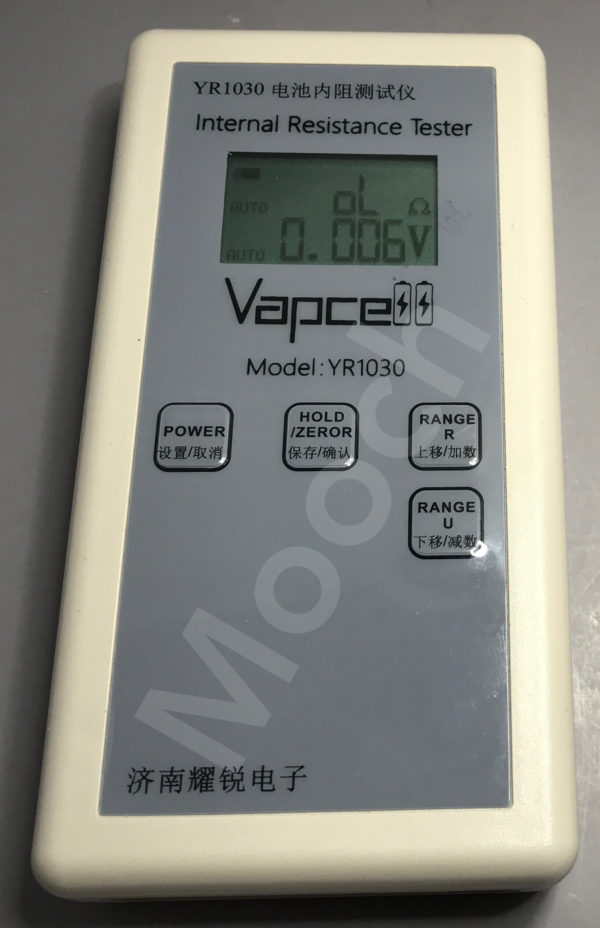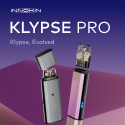This is just a quick look at a battery tester Vapcell sent me. This was not a comprehensive test or a check of build consistency between units, durability, reliability, or safety.
The YR1030 is an affordable, accurate tester that measures the AC internal resistance of a battery. This is the the internal resistance typically listed in a battery’s datasheet. It is measured using a low voltage, low current 1000Hz sine wave injected into the battery and then measuring the battery’s response.
The AC internal resistance is lower than the DC internal resistance which is used to determine how much a battery’s voltage will sag when current is drawn from it. But, the AC internal resistance is the industry standard and the only number typically posted by the manufacturers.
This meter can be used to measure the AC internal resistance of different cells to roughly gauge their relative performance or to help find fakes. Vendors could use it for spot checking new shipments to see if low amp fakes were mixed in with a batch of higher current rated cells.
It operates from an internal pouch cell, probably LiPo, which is recharged via USB. The cell stayed cool and charged to 4.14V in my unit. This helps extend the life of the cell versus charging to 4.20V.
The tester comes with the dual-pin probes shown in the photos. The alligator clamps and battery testing fixture are optional extras. Which you use depends on how you will do your testing. I recommend using the pin probes or battery fixture as using the alligator clamps means you need a way to mount the battery.
I compared the readings from the Vapcell YR1030 against the ones I got using my BK Precision BA6010 Battery Analyzer. The results were quite close and consistent. This is important as a consistent error, i.e., an offset, can be compensated for. But inconsistent readings are useless.
This meter has “binning” functionality to help sort battery grades based on internal resistance ranges defined by the user. I suspect this is a popular unit for the China battery wrappers to use for grading cells.
The internal layout and design are okay but the flux residue on the circuit board from the hand soldered components was disappointing to see. At this price point though there has to some compromise. I saw some weirdness and locking up when recharging and trying to turn it back on but cycling the power cleared up any issues.
I would have preferred that the unit was powered from the battery being tested, instead of from an internal LiPo, but that’s just a personal preference.
You must be consistent in your testing though to get the best results from this unit. Clean the battery contacts, charge the battery, let it sit for an hour to come to room temperature, and then test it multiple times. Handle it as little possible to minimize the temperature rise from your body heat. This is all important for consistent readings. Contact Vapcell with any questions you have regarding the features and use of this unit.
Overall this seems to be a good unit for the price, around $75USD, and could be a nice addition to a shop’s/vendor’s cell testing program. I believe that Liion Wholesale (www.liionwholesale.com) has them and the accessories in stock.
Vapcell (www.vapcelltech.com) donated one unit for the purposes of testing. Thank you!
Photos and test results: https://imgur.com/a/ZQPQD
Test report: https://www.e-cigarette-forum.com/threads/quick-look-vapcell-yr1030-ac-internal-resistance-battery-tester.852255/
Misusing or mishandling lithium-ion batteries can pose a SERIOUS RISK of personal injury or property damage. They are not meant to be used outside of a protected battery pack. Never exceed the battery’s continuous current rating and keep the plastic wrap and top insulating ring in perfect condition.
Testing batteries can be dangerous and should never, ever, be attempted by anyone who has not thoroughly studied the dangers involved, understands the risks, has the proper equipment, and takes all appropriate safety precautions.















 Store
Store












